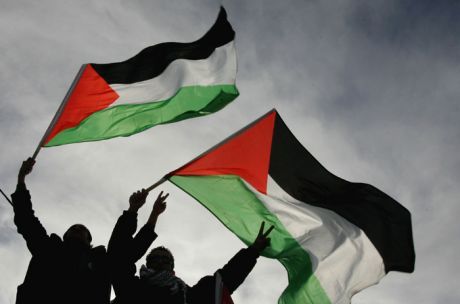Features
You are here
Free Palestine, free the world

March 20, 2015
This year is the tenth annual Israeli Apartheid Week and a decade of the campaign for Boycott, Divestment and Sanctions against Israel. Through the years Palestine solidarity has been intertwined with movements challenging war and defending free speech, which is why it is increasingly under attack including the threat of Bill C-51.
While the West turned away boats of Jewish refugees fleeing imperial Germany, it supports colonial Israel in driving Palestinians from their lands. The West arms Israel and the Arab dictatorships on which it depends to control the region’s resources, and periodically unleashes Israel against resistance movements in the region. But over the years Palestinian resistance has become intertwined with global resistance.
Inspiration
The second Palestinian Intifada of 2000 was an inspiration around the world, including to the anti-globalization movement of 2001—where numerous participants began wearing the keffiyeh. The anti-globalization movement helped fuel the historic movement against the Iraq War of 2003, which created a wide audience for Palestine solidarity. Annual conferences in Cairo brought together hundreds of activists across the Arab world, and allies from the West, to support the resistance in Iraq and Palestine and build movements against globalization, Zionism and imperialism.
In 2005, a year after the International Court of Justice declared Israel’s apartheid wall illegal, Palestinian civil society launched the BDS campaign—uniting Palestinians in Israel, the occupied territories and refugees in the diaspora. At the same time Israeli Apartheid Week was launched in Toronto.
Instead of the Iraq War paving the way for the invasion of Iran it provoked resistance around the world, including electoral gains for Hizbullah and Hamas. Frightened by the democratic aspirations of the Arab World, the US unleashed Israel to bomb Lebanon in 2006 and Gaza in 2009. Harper joined the siege on Gaza by cutting humanitarian aid, and defended the Lebanon War as a “measured response.” But there were anti-war demonstrations across the country, including tens of thousands in Montreal, and the wars failed to defeat the resistance movements.
Criminalization
Western countries have increasingly criminalized Palestinian solidarity in an attempt to sever its support for Palestinian resistance, stop its radicalizing impact at home, and to justify attacks on civil liberties. In 2009 the Tories and Liberals created the “Canadian Parliamentary Coalition to Combat Anti-Semitism,” in 2010 Pride Toronto tried to ban Queers Against Israeli Apatheid, and in 2011 Rob Ford tried to use QuAIA as an excuse to cut funds to Pride, but these were resisted as part of the repolitization of Pride.
Harper has gone on a rampage—barring Palestinian solidarity speakers from the country, cutting funds to NGOs who support human rights in Palestine. The Tories cut funding from the Canadian Arab Federation, KAIROS, UNRWA, Rights & Democracy, banned of British MP George Galloway and Dr. Moustafa Barghouthi from entering Canada, and defunded Palestine House. But these have also been challenged, including a reversal of the ban on Galloway, followed by a speaking tour across the country. Tory attacks encouraged campuses to clamp down on student activism, including banning posters for Israeli Apartheid Week, but these failed to stop its spread to more than 50 cities around the world—along with the a dozen student unions endorsing BDS.
In 2010 and 2011 Palestine solidarity activists around the world organized humanitarian flotillas to break the siege on Gaza. While Harper was welcoming Netanyahu in Ottawa in 2010, Israeli forces stormed the flotilla and killed unarmed activists, and tasered activists the next year. But the attempt to kill Palestine solidarity failed.
Arab Spring and counter-revolution
In 2011 the Arab Spring erupted, raising the hope of toppling all the dictatorships on which Israel Apartheid depends. The Egyptian revolution followed years of inspiration from Palestinian resistance, combined with growing strike waves and struggles for civil liberties. Israel lashed out at Gaza in 2012 but was restrained by the US, anxious about the impact of war on revolutionary Egypt.
But the West intervened to stop the Arab Spring—highjacking the Libyan revolution and arming counter-revolutionary Saudi Arabia to send troops to Bahrain and to arm sectarian groups in Syria. After counter-revolution in Egypt, Israel launched another war on Gaza and the Egyptian regime blocked a humanitarian convoy. The war killed thousands but failed to defeat the resistance, while provoking even greater solidarity demonstrations—this time in the wake growing indigenous sovereignty and solidarity movements like Idle No More. As the Palestinian BDS National Committee wrote, “For Palestinians and people of conscience everywhere, 2014 will be remembered as the year in which Israel carried out its bloodiest ever massacre of Palestinians in the besieged Gaza strip. 2014 was also a year of resistance that saw continued resistance and unprecedented international solidarity with Palestine and huge steps forward for the boycott, divestment and sanctions (BDS) movement.”
So Western governments have again gone on the offensive. France, the so-called bastion of free speech, became the first country to ban Palestine solidarity demonstrations, while Canada has passed laws against “the promotion of terrorism in general” that will target indigenous resistance from Turtle Island to Palestine. The West is using ISIS, a product of Western-backed counter-revolution, to smear Palestinian resistance and solidarity--which is the best antidote to ISIS.
But ten years after the launch of BDS and IAW, Palestinian solidarity continues to grow—exposing the complicity of states and corporations on which Israeli Apartheid depends, as well as the potential for building movements of peace and justice to free Palestine, and free the world.
Join Israeli Apartheid Week-Toronto March 24-28.
If you like this article, register for Rage Against the System, a weekend conference of ideas to change the world. Sessions include "Imperialism and resistance," "Colonialism and Indigenous resistance," and "Secularism, Islamophobia and the new racism."
Section:









